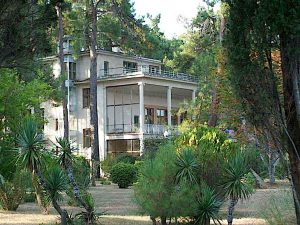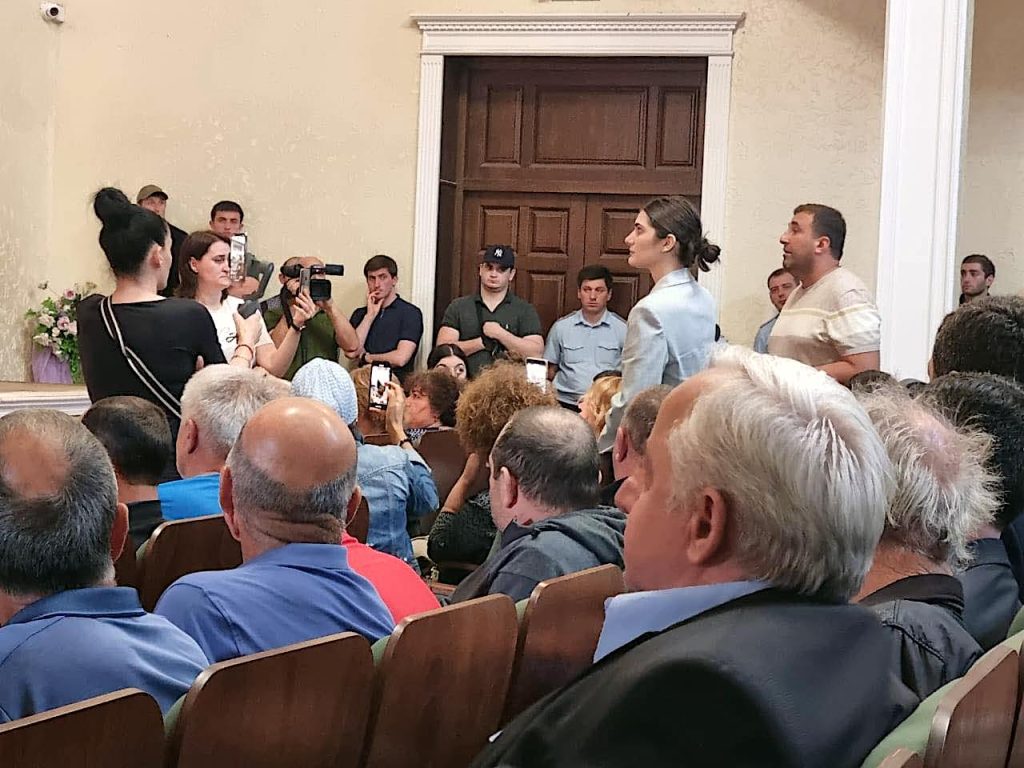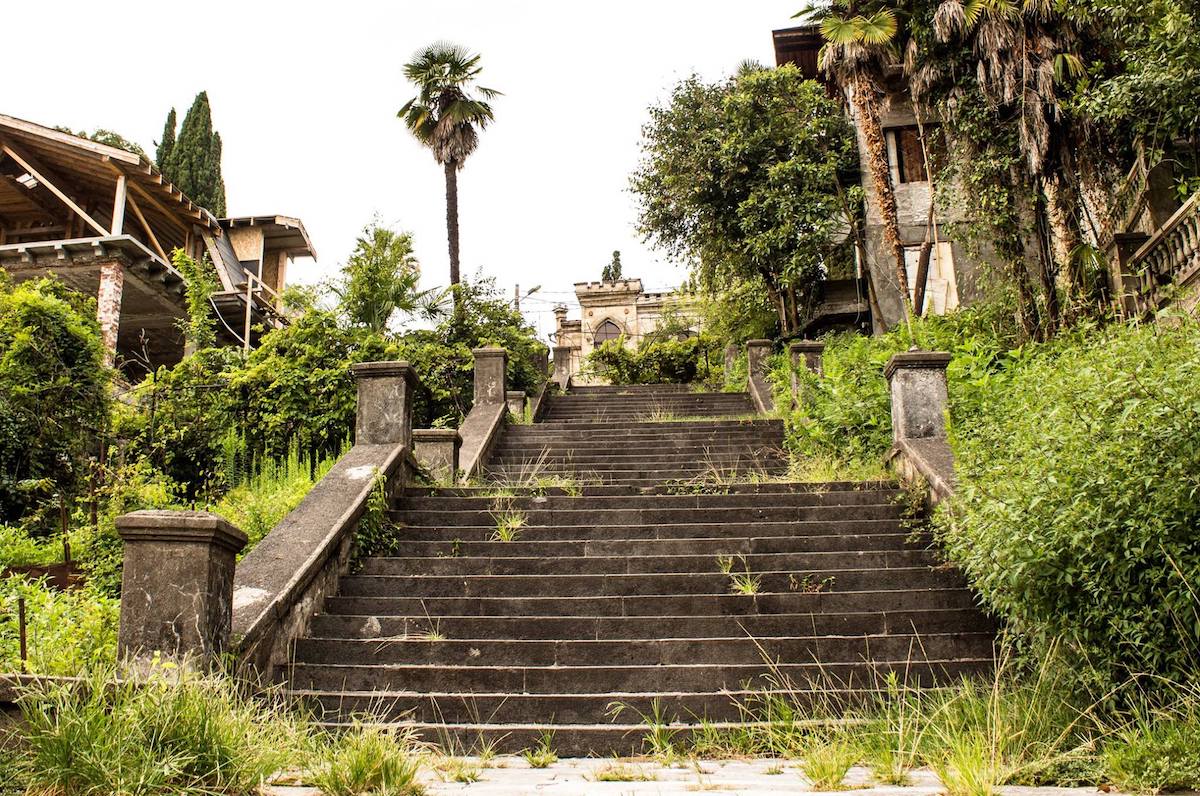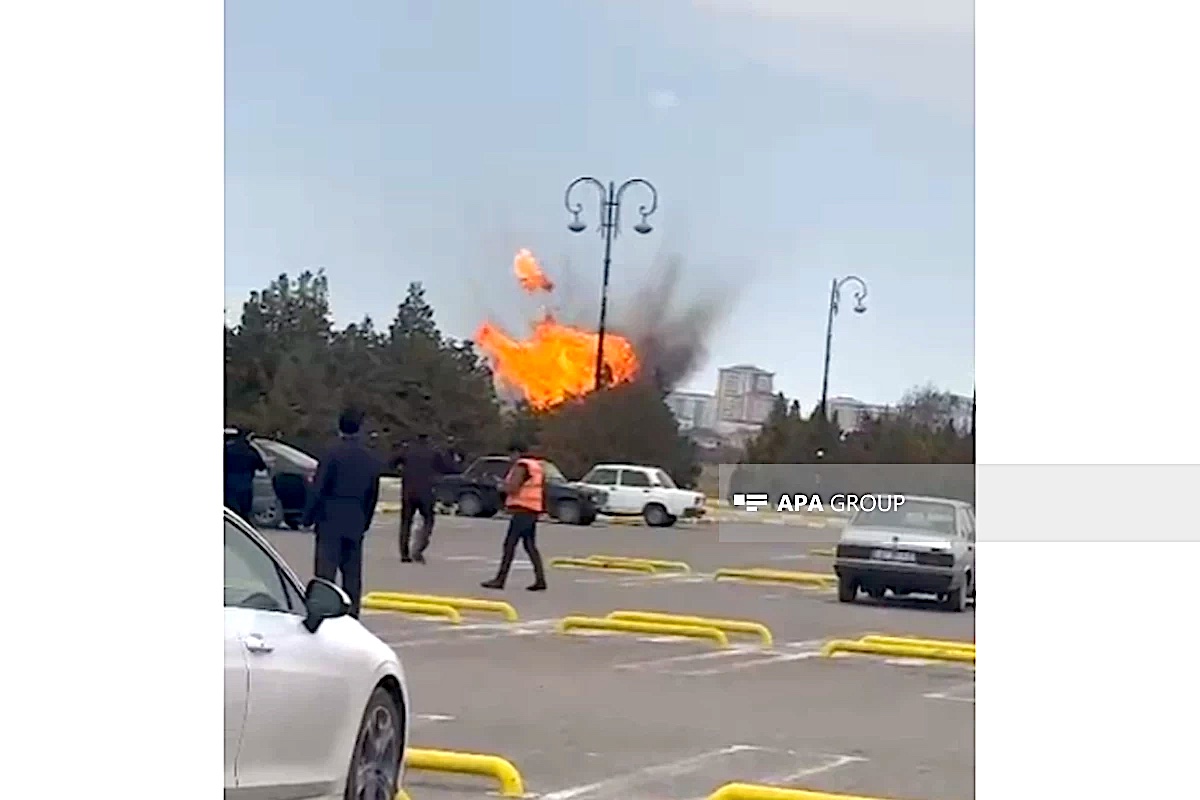"We must give the territory to Moscow, or it will turn its back on Abkhazia" — Bzhaniya
Bzhaniya and the transfer of territory in Abkhazia to Russia
“Abkhazia will not be able to ensure its prosperity and peace without the support of Russia,” President Aslan Bzhaniya declared at a meeting with the public this week, one of several in the territory.
Officially these trips concern the reports of district heads on work done in the first half of the year. But in reality, the president is clearly trying to make a case for the government’s decision to transfer a state dacha in the seaside resort of Pitsunda to Russia.
The place among the pines

Soviet leader Nikita Khrushchev’s former summer house has an area of 184 hectares, including part of a pine tree reserve.
The issue is to be considered by the Parliament of Abkhazia in the near future.
This former summer residence of Soviet leader Nikita Khrushchev enjoys an area of 184 hectares, including a section of scarce Pitsunda pine.
The issue is set to be considered by the Parliament of Abkhazia in the near future.
Aslan Bzhaniya has already visited Tkuarchal and Ochamchira, and arrived in Gudauta on July 22. At each meeting he explains the motives which prompted Sukhum to sign an extremely controversial agreement on the transfer of the residence:
“It is necessary to turn over the dacha, otherwise Russia will turn its back on Abkhazia.
“Can we ensure prosperity, peace and tranquility without the support of Russia? What alternative do we have? Do we have neighbors who will give us the same support? We are at war with another neighbor, how can we forget that?
“Some public figures either do not understand or pretend not to understand that the West only pretends to want to help us. It is not true. If someone wanted to help us, we would have official recognition.
“Would our country have been recognized if Russia had not taken the first step? Russia could live without this property, but whether we will live without Russia’s support is another matter,” the president said at a meeting with activists of the Tkuarchal region on July 20.

A private request
At a public meeting in Ochamchira, this argument did not go over as hoped. So Bzhaniya pulled out a trump card, which in a different situation he would hardly have dared to use in public:
“Putin has personally asked me to transfer the property to his ownership.”
Abkhazians for the most part respect Vladimir Putin. Some respect him even more than their own president. And Russia is considered their main ally and partner.
But in Abkhazia, everything related to Abkhazia’s sovereignty is painful. Property and land, from the Abkhazians’ perspective, are an integral part of their sovereignty.
- War and peace: how Abkhazia adapts to international sanctions against Russia
- Op-ed: Abkhazia is not South Ossetia – it will not join Russia
- Op-ed: Abkhazia finds itself in a new geopolitical reality
The agreement must still be ratified by Parliament, and it appears that the populace wants nothing to do with it. The deputies, for their part, are biding their time — if the president fails to quell the wave of protest, the People’s Assembly is unlikely to risk approving the document.
Abkhazian democracy is a very tangible thing. Any president of Abkhazia must reckon with actual civil society, otherwise he may pay with his seat.
Aslan Bzhaniya understands this very well, and has therefore embarked on this tour of the region. But so far, even by invoking the Russian president by name, he has not been able to assuage public discontent.
If it ain’t broke, don’t fix it — old or new document?
Opponents of the agreement propose leaving a former agreement in effect. The residence was given to Russia for perpetual use under an agreement concluded in 1995.
Critics claim there are several problems with the new document.
First of all, the agreement is contrary to current legislation — lawyers have counted more than thirtty violations. In the video below, former MP Harry Kokaya says the document was submitted to Parliament, but MPs refused to consider it due to many errors and violations.
“Can’t we do it within the law if we want to show our fraternal relations? Why stir up society and create a a scandal? Why create [a situation] of anti-Russian sentiment? We are grateful to our partners, we know how much they do for us, how much he has done for us. Every Abkhazian knows the significance of our cooperation,” says Kokaya.
Russia may become interested in other territory in Abkhazia
The agreement on the state dacha in Pitsunda is disastrous for Abkhazia, as it is tantamount to opening a Pandora’s box.
Many fear that the precedent will become a “locomotive” that will inevitably drag other pieces of Abkhazia along with it. In effect, it may whet Russia’s appetite for for more of the territory.
Sovereignty should not be the price of alliance
In fact, the question of the Pitsunda residence’s future reaches far beyond its territory.
This is rather a test of the Abkhaz authorities’ legitimacy, of its ability to build relations with its main ally and guarantor of security, so as not to pay for friendship with Moscow with its sovereignty.
And yet due to the inability, and often outright unwillingness, to change anything in managerial methods, this very sovereignty has suffered over the past fifteen years.
Instead of painstaking work to reform the entire system, the authorities chose the most convenient option for themselves — to become footnotes of the Russian budget.
The well-known principle of “you scratch my back, I scratch yours” has gradually become the unofficial law of the land.
A failure to rethink and revise ingrained habits will sooner or later lead to a complete loss of sovereignty. The question of Bzhaniya and the transfer of territory in Abkhazia to Russia is not just one case, but a template for the future of Abkhazia.
Terms, place names, opinions and ideas suggested by the author of the publication are her / his own and do not necessarily coincide with the opinions and ideas of JAMnews or its individual employees. JAMnews reserves the right to remove comments on posts that are deemed offensive, threatening, violent or otherwise ethically unacceptable.



















